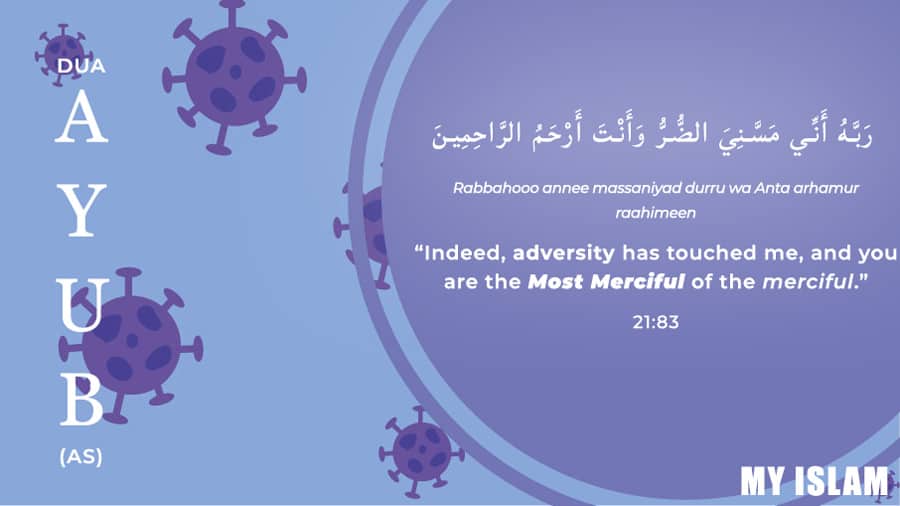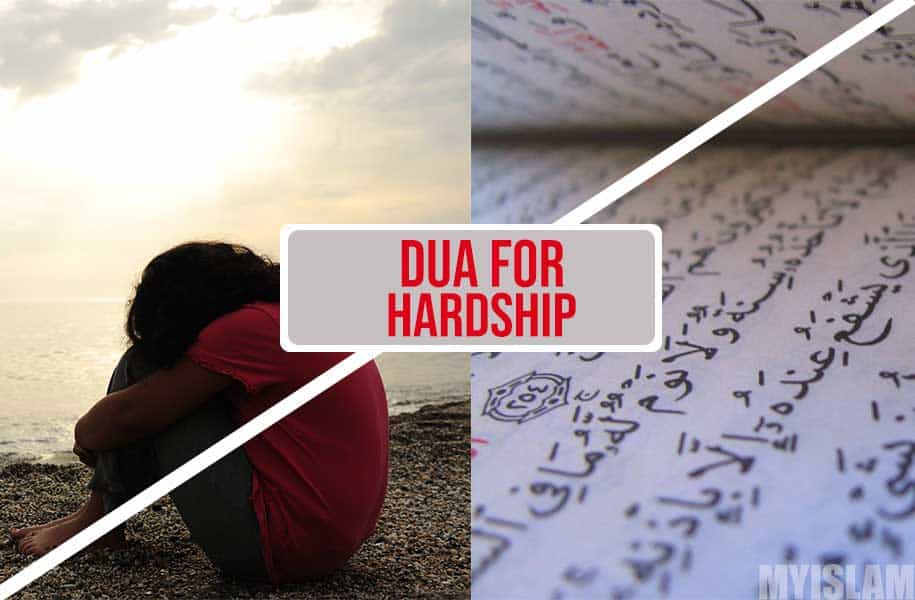
رَبَّهُ أَنِّي مَسَّنِيَ الضُّرُّ وَأَنْتَ أَرْحَمُ الرَّاحِمِينَ
Rabbahooo annee massaniyad durru wa Anta arhamur raahimeen
“Indeed, adversity has touched me, and you are the Most Merciful of the merciful.”
Surah Anbiya Ayat 83
Key Takeaways:
- The story of Prophet Ayyub is a reminder that as quickly as Allah (swt) gives provisions he can take it away. Similar to the message in the Qur’an “Wherever you may be, death will overtake you, even if you should be within towers of lofty construction” (4:78).
- Ayub (as) teaches us that when faced with adversity we should accept reality and not complain or wish it to be another way. He does not say, I am one of your Prophets, how could I suffer like this. Instead, he says, “You are the Most Merciful of the merciful” because through Allah’s mercy all issues can be repaired.
- There are 5 stages of grief a person will naturally go through, denial, anger, depression, bargaining, and acceptance. On the path to recovery you want to avoid spending too much time in any of the first four stages. People can get stuck in the “woe is me” mentality and drift into self-pity, don’t let that happen to you. We have power and can turn to Allah (swt) and ask for his mercy and his aid.
Prophet Ayub (as) Dua in adversity
Prophet Ayyub (as) was tested severely, Allah had blessed Ayyub with all kinds of worldly success, but in a blink of an eye, it was all taken away from him. He lost his children, he lost all his wealth, and his health began to deteriorate. The people of the city who put their trust in Ayyub (as) began to doubt his authority believing that a messenger of Allah would not suffer in this capacity. So, they all abandoned his side. In the end, only a few people stood by him, one being his loving wife.
The historians and scholars have recorded different durations which they believe the Prophet’s illness had lasted. Some claim it was three years, and others claim eighteen years. Regardless of the duration, we know that Prophet Ayyub (as) had endured it patiently.
There are 5 stages of grief a person will naturally go through, denial, anger, depression, bargaining, and acceptance. It is normal for a person to go through these emotions, but many people often get stuck in the bargaining phase and never leave. For example, people who buy shares of a public company in the stock market may know this feeling too well, “please just let it bounce back so I can sell and break-even”. If you ever utter these words it may be a sign of entering the bargaining phase.
Some may end up holding that position forever watching it go lower and lower until some external event forces them sell and accept their loss.
Why does this happen?
I think it’s because we spend too much time wanting the world to work in a way it does not operate.
As we mentioned previously the Qur’an tells us, “And We will surely test you with something of fear and hunger and a loss of wealth and lives and fruits, but give good tidings to the patient,” (Surah Baqarah Ayat 155)
By understanding this we are mentally equipped to handle whatever comes our way. This is the idea of the truism hope for the best but prepare for the worst. We allow ourselves to be optimistic about the future but manage our expectations to be able to handle a different outcome. This is not the same as being pessimistic; we’re arming ourselves to skip the 5 stages and go straight to acceptance allowing us to not be paralyzed by inaction.
The lesson we can learn from Prophet Ayyub (as) story, is when tragedy strikes, try your best to accept your fate and to see the world as it is and to not be afraid to see what you see.
One important note, Prophet Ayyub (as) did not make this du’a once and all his troubles disappeared overnight. No, he prayed constantly, endured it patiently, and he kept his hope and faith in Allah (swt). He never drifted into self-pity or the “woe is me” mentality because it will not improve his situation. It truly is a ridiculous way to behave if you stop to think about it. It accomplishes zero and is a negative mindset to be in.
His words bring awareness to the fact that he is in distress, he does not need to say anything more. He does not live in denial, but he also does not complain or whine of the unfairness or the perceived injustice. He does not say, I am your Prophet how could I suffer like this.
He simply says, “You are the most Merciful of the merciful” because through Allah’s mercy all issues can be repaired.




ASSAMULIKUM,I AM JARIFYEAMIN.I WANT TO KNOW ABOUT AYUB (AS)